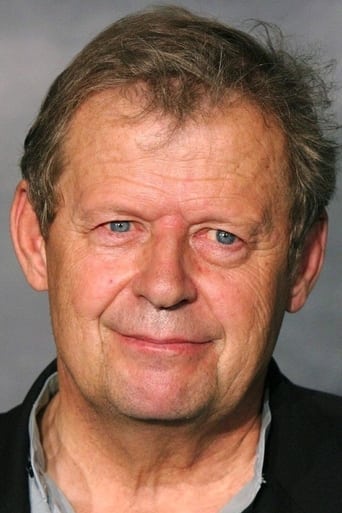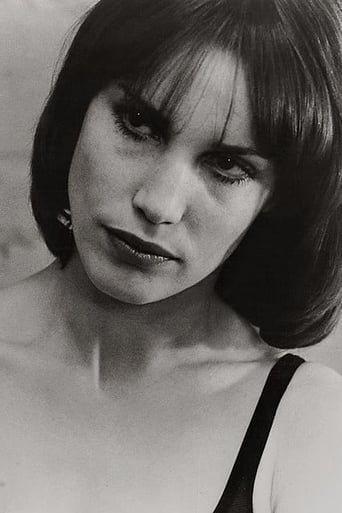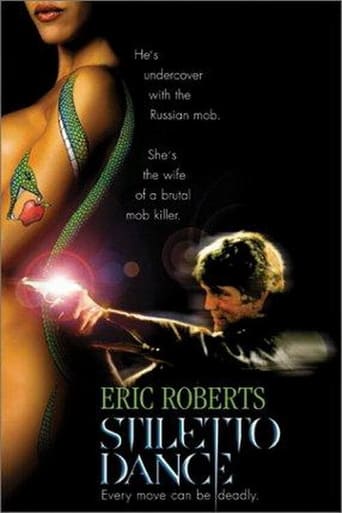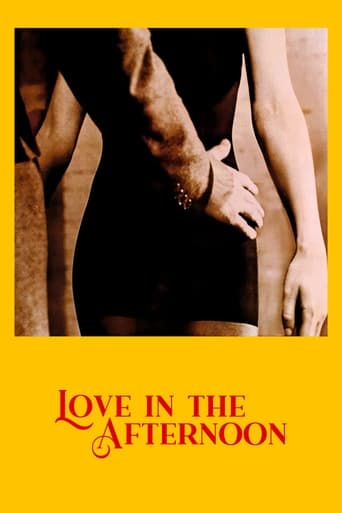
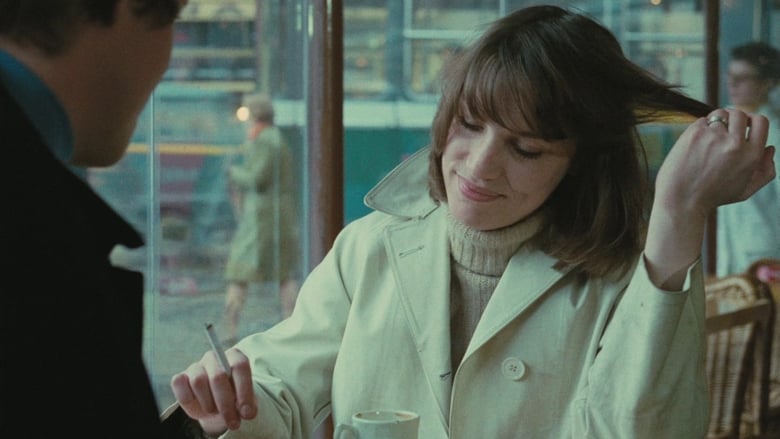
Love in the Afternoon (1972)
The last of Rohmer's Six Moral Tales. Frederic leads a bourgeois life; he is a partner in a small Paris office and is happily married to Helene, a teacher expecting her second child. In the afternoons, Frederic daydreams about other women, but has no intention of taking any action. One day, Chloe, who had been a mistress of an old friend, begins dropping by his office. They meet as friends, irregularly in the afternoons, till eventually Chloe decides to seduce Frederic, causing him a moral dilemma.
Watch Trailer
Cast
Similar titles
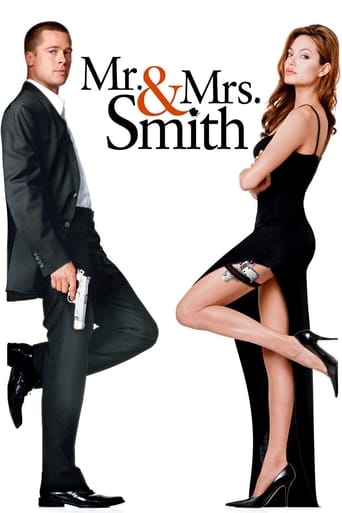
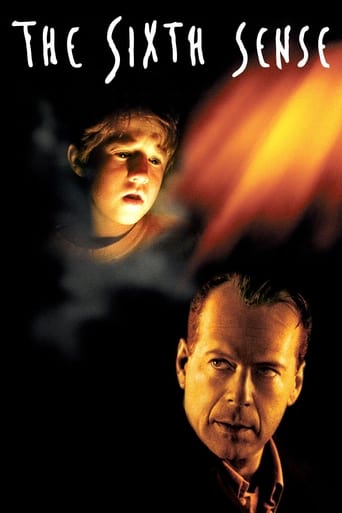
Reviews
Instant Favorite.
hyped garbage
Highly Overrated But Still Good
It is not deep, but it is fun to watch. It does have a bit more of an edge to it than other similar films.
"Chloe in the Afternoon" is the sixth and final work in Eric Rohmer's "Six Moral Tales" film series. While the film's story is quite simple (a married, bourgeois man encounters a woman named Chloe who he hasn't seen in years, and begins to have some sort of a love affair with her), the film's characters are not!All of the "Six Moral Tales" provide the viewer with a cast of excellent and memorable characters. Even if these characters aren't always the most likable (just look at the film "La collectionneuse"), they are always very interesting to watch. I believe that the characters in "Chloe in the Afternoon" may be the greatest characters in the "Six Moral Tales" series. Especially the character of Chloe, a very smart and likable character who offers a lot of the film's greatest and most interesting dialogue (great dialogue is another feature that is all over this film series).Another thing that I found highly impressive about the way her character was written was how she is given a clear back story, but, instead of her back story being forcefully told to the audience in detail all at once it is simply glanced over. It is perhaps the least forced back story given to a character in any other film that I've seen.The film also turns out to be the most emotional of the "Six Moral Tales", with a truly compelling ending sequence. You can tell that director Eric Rohmer's films really began to mature since the earliest of the "Moral Tales", the 1962 short film "The Bakery Girl of Monceau".While it isn't the best of the "Six Moral Tales", and it was kind of slow at times, it is a perfectly fitting ending to one of the greatest of all film series!
When Irwin Shaw wrote a short story called 'The Girls In Their Summer Dresses' and placed it with the New Yorker he probably had no idea it would become one of the most anthologized American short story of the 20th century and would possibly inspire Eric Rohmer to take it as the starting point of the last of his Six Moral Tales. There was a lot of Shaw himself - who was married when he wrote it - in the main character, a reasonably happily married man possessed of an uncontrollable urge to look at other women even when out with his wife. Rohmer has created a similar affliction in Frederic (Bernard Verley), equally happily married to Helene (Francoise Verley), who is already the mother of his first child and bears him another during the course of the film. Rohmer takes Shaw's premise towards, if not actually to, its logical conclusion, by having Frederic concentrate on just One girl, Chloe (Zouzou - this was the name of James Stewart and Donna Reed's daughter in Capra's 'It's A Wonderful Life' and French directors being as they are, enamored of Hollywood, it's not impossible that Rohmer cast the actress merely because of her name). When we meet her first Choloe is very much the bohemian sporting bulky sweaters and jeans but as the film progresses she graduates to the kind of chic clothes that epitomize French women, girls in summer dresses indeed. Nothing, of course, happens. In this kind of film nothing ever does. Chloe is frank in her intention to seduce Frederic and he comes that close to succumbing but that's all, folks. This is the kind of movie it's tough to promote, its target audience is the habitué of the small salle, semi art house which still, thankfully, flourishes in Paris but forget UCI type chains.
As all other Rohmer films Chloe is about feelings, emotions, dialogues, testing moral taboos.... Although I did not like all the acting - some minor characters are not very good and their acting looks artificial - the film keeps you intrigued till the end.It is not a movie for the "masses" : there is no sex, no guns, no fights, no cops. If this your idea of movies like it seems to be the norm in some countries west of Europe go instead to your local Blockbuster or Video Update and get the latest of Rambo, Lethal...,blah, blah, blah...If instead you want to think then it is definitely worth seeing.
Veteran French actor Bernard Verley stars as Frederic who is the kind of man who loves women with a great passion, but finds that he can direct all that love physically into one woman. Chloe is a woman, cynical about men, confident of her power of seduction, a woman who never wants to marry. They were friends and now they meet again. He is married, a successful businessman. She is single, living from day to day. What will happen? Will she entice him away from his wife? Will he find the French happiness with a wife and a mistress? The title, while good, is misleading, as is the sexy cover on this video. (The French title, L'amour l'apres-midi, is better; but that title in English was taken by Love in the Afternoon (1957) starring Gary Cooper and Audrey Hepburn.) This is about as sexy as a Disney movie (although there is some backside nudity), yet it is an intriguing story about love, human sexuality and the question of monogamy. I can already see some of the other reviews: "Too talky." "Endless talk and no action." Ah, but they are wrong. This is a fascinating film in which the action is subtle and true and very interesting.Francoise Verley plays Frederic's wife. She is not nearly as pretty as he thinks she is. Nor is she as removed from his life away from her as he naively believes. Eric Rohmer's subtle direction makes it clear that she knows more than she will ever tell him, that she loves him and perhaps prays that he still loves her. But she is above saying a single word. One gets the sense that she knows he is a man so attractive to other women that it is inevitable that he will stray. But does he? The final scene in which we know why she is crying--although ironically, he does not--is just beautifully done and ends the movie at exactly the right moment.Zouzou plays Chloe who is Parisian, bohemian and quietly desperate. As usual with Rohmer there is a kind of realism in the movie that defies description. The people and the scenes and the events are real; there is no straining for effect, and everything is understated with a characteristic Rohmerian message about human nature.This starts slow and never really speeds up, but do yourself a favor and stay with it. The denouement is beautifully turned and the revelation of the three principal characters is as clear and clean and agreeable as Chloe after her shower.(Note: Over 500 of my movie reviews are now available in my book "Cut to the Chaise Lounge or I Can't Believe I Swallowed the Remote!" Get it at Amazon!)
